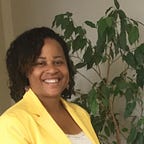When We Step Aside
Stepping aside is often looked down upon in our society. Just consider the last time you asked someone to step aside so you could walk past or the last time you tried to change car lanes — while signaling. Somehow stepping aside is considered a sign of weakness. Yet there is much to be gained when we are willing to step aside.
The most recent example of the power of stepping aside came during the 2021 Olympics. Simone Biles, a multi-gold olympian, made the decision to step aside. Biles made the clear choice to center herself and her health rather than take center stage and compete. The headlines show just how unusual her act was. News outlets used words like “withdraw”, “drop-out”, and “plagued” to describe Biles decision to step aside. All words that hold a less than positive connotation. Yet it was exactly Biles ability to courageously step aside that allowed Suni Lee to make history as the first Hmong gymnast to win a gold medal. When we are brave enough to listen to our intuition and step aside we make space for other to contribute, to have an impact.
I first learned this truth as a classroom teacher. It was Fall 2003 and a year earlier I had gone through a divorce. That same year my youngest brother of whom I was the legal guardian went off to college. For the first time in my life I was living alone. Prior to this moment, I felt fulfilled as a teacher. Now the short 5-minute drive to work felt like an hour. My perspective of the quick-witted and talented 7th graders shifted to a stereotypical frame of adolescents. To put it bluntly I was struggling. The struggle manifested in writing referrals, incomplete lesson plans, and nights of crying myself to sleep. By April 2004, I knew I needed to step aside from the classroom. Yet the idea of centering myself brought about guilt and shame. Aren’t teachers supposed to sacrifice, to push through even when it is hard.
Luckily I had a new vice-principal, Dr. Davies. She saw that I was sinking. She also remembered that I had started writing for a local magazine — writing and reading have always been my tools for coping with transitions. She called me into her office inquired about my latest article and then asked me the question no one else was willing to ask: “Do you want to be here?” My answer came with a sob. “No, I need to take some time away.” Without judgment, Dr. Davies explained how I could responsibly take a leave of absence and not return after spring break. She gave me the appropriate language to use with human resources so that my needs could be prioritized. I took the first hard step and applied for a leave of absence for the remainder of the year and the following year.
The first week after spring break was hard. I had left lesson plans for the rest of the school year and had even walked the long-term sub through the plans. A few students emailed to ask if I was okay and to confirm that they did not cause me to leave. Two weeks after my leave I learned that the long-term substitute had resigned. Guilt and shame rose up again. For a week various subs took over my teaching responsibilities. Just when the weight of wondering if I had made a mistake and harmed my students felt heaviest, I learned that a parent of two of my former students had become a sub and would take over the position.
I knew Ms. Greer well. I had taught her son and daughter and worked with her sister. Ms. Greer had been wanting to teach at the middle school but there were no open positions — our English Language Arts staff was pretty stable. It was an unexpected gift to hear that my departure created a space for Mrs. Greer. Mrs. Greer stayed on the following year as well. I returned in the Fall of 2005 part-time and had the pleasure to teach alongside Mrs. Greer. To listen to her share how she had desired the opportunity to teach at the middle school and had almost given up. I also got to hear from my students who I had the year I left. They returned to the middle school to share their transition to high school. They also shared the fun they had learning with Mrs. Greer.
Stepping aside is not easy — particularly for teachers. Yet stepping aside allows one to make space for others. Allows for history to be made, for opportunities to be realized. Stepping aside also affirms our right to center ourselves and to know that the universe will and can fill in the gaps.
Today Oakland Unified School teachers and other teachers across the nation started a new academic year. While the narrative will be to do all you can to provide an effective and equitable education, some educators will get the internal signal that it is time to step aside. A signal that says, “Center yourself.” For those whose intuition calls out, it is okay to listen. To make the decision to step aside, knowing that doing so will allow someone else the space to contribute, to carry on the good work. Hopefully, like me, sometime in the future you will get to hear how your courage to center yourself allowed someone else to realize a desire they had been striving towards.
